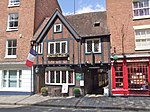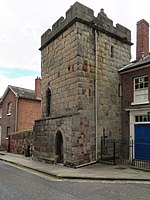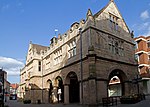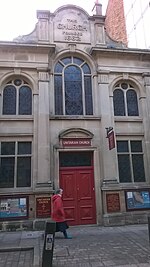Shrewsbury Cathedral
19th-century Roman Catholic church buildings in the United KingdomChurches in ShrewsburyE. W. Pugin church buildingsGothic Revival architecture in ShropshireGothic Revival church buildings in England ... and 6 more
Grade II* listed Roman Catholic churches in EnglandGrade II* listed churches in ShropshireRoman Catholic Diocese of ShrewsburyRoman Catholic cathedrals in EnglandRoman Catholic churches in ShropshireUse British English from February 2021

The Cathedral Church of Our Lady Help of Christians and Saint Peter of Alcantara, commonly known as Shrewsbury Cathedral, is a Roman Catholic cathedral in Shrewsbury, England. It is the seat of the Roman Catholic Bishop of Shrewsbury and mother church of the Diocese of Shrewsbury, which covers the historic counties of Shropshire and Cheshire. The cathedral is particularly notable as being the only cathedral in the county. Unlike most other English counties and county towns, neither Shropshire nor Shrewsbury has a Church of England cathedral.
Excerpt from the Wikipedia article Shrewsbury Cathedral (License: CC BY-SA 3.0, Authors, Images).Shrewsbury Cathedral
Belmont,
Geographical coordinates (GPS) Address Website External links Nearby Places Show on map
Geographical coordinates (GPS)
| Latitude | Longitude |
|---|---|
| N 52.7053 ° | E -2.754 ° |
Address
Shrewsbury Cathedral
Belmont 11
SY1 1TE , Frankwell
England, United Kingdom
Open on Google Maps










